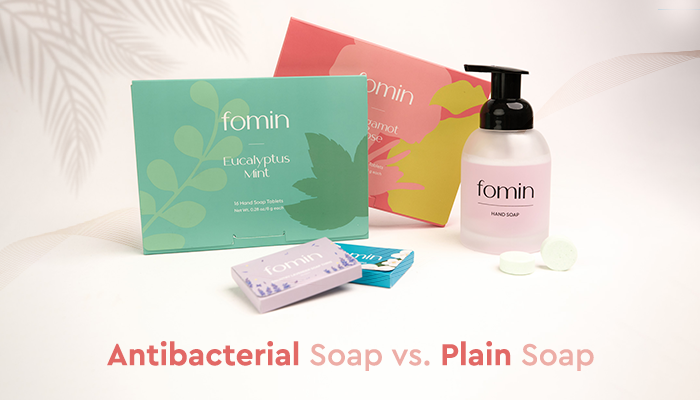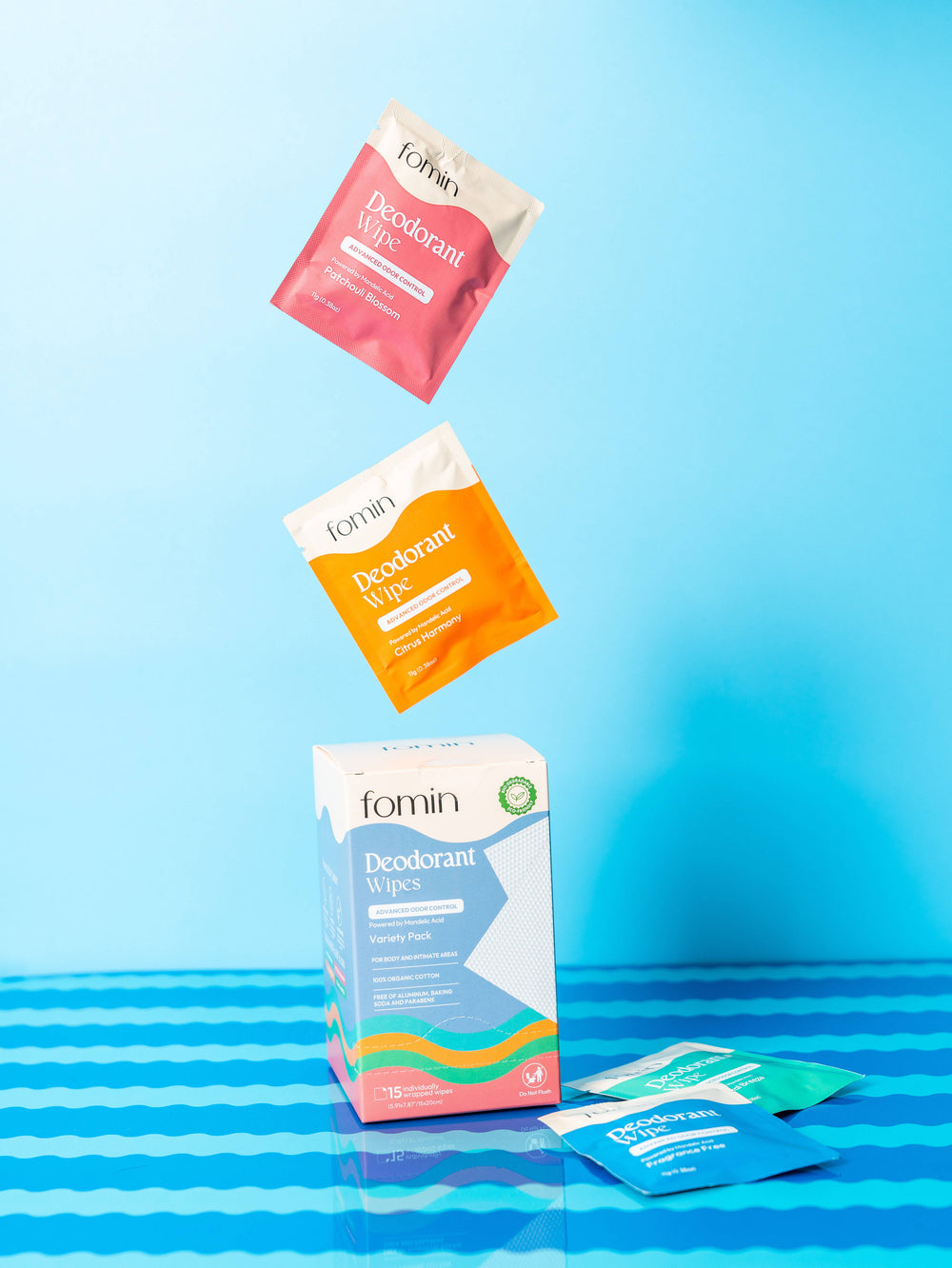
Antibacterial Soap vs. Plain Soap: Which One Should You Use?
Share
When it comes to maintaining good hand hygiene and protecting ourselves from harmful germs, the choice between antibacterial soap and regular soap has long been a topic of debate. But is antibacterial soap really more effective than plain soap?
According to the Food and Drug Administration (FDA), the answer might surprise you. There's actually no solid scientific evidence to support the idea that over-the-counter antibacterial soaps are more effective at reducing your risk of infections and illnesses compared to regular soap bars.

In this article, we'll delve into the fascinating world of soap, exploring the key differences between antibacterial and plain soap, and helping you make an informed decision about which one should find a place by your sink.
Antibacterial Soap vs. Plain Soap: Which is better?
The debate between antibacterial soap and plain soap revolves around the question: "Which is better?" Let's examine the key factors to consider when choosing between these two options to help you make an informed decision about what suits your needs best.
1. Ingredients
Antibacterial Soap: Antibacterial hand soap contains specific chemical agents like triclosan, triclocarban, or chlorhexidine. These ingredients are added to kill or inhibit the growth of bacteria, some fungi, and, in some cases, viruses.
Plain Soap: Plain soap, also known as non-antibacterial soap, typically contains natural fats or oils (such as palm oil, coconut oil, or olive oil) and an alkali (usually sodium hydroxide). These ingredients create a cleansing compound called soap through a process called saponification. Plain soap does not contain additional antibacterial agents.
2. Germ-Killing Mechanism
Antibacterial Soap: Antibacterial soap contains chemical agents like triclosan or triclocarban that actively target and eliminate a broad spectrum of microorganisms. These chemicals disrupt microbial cell membranes or inhibit their reproduction, leading to immediate germ elimination upon contact.
Plain Soap: Plain soap operates through a different mechanism. It doesn't actively kill germs but instead physically removes them, along with dirt and oils, from the skin or surfaces. This is achieved through the process of emulsification, where the soap molecules surround and lift away contaminants, allowing them to be rinsed away with water. While not instant, this method effectively cleanses and decontaminates.
3. Antibiotic Resistance
Antibacterial Soap: Prolonged use of antibacterial soap can contribute to antibiotic resistance as bacteria may develop resistance to the antibacterial agents. This poses a significant public health concern.
Plain Soap: Plain soap does not contain antibacterial agents that promote antibiotic resistance. This makes plain soap a safer and more sustainable choice for long-term use in promoting hand hygiene without the associated risk of diminishing antibiotic effectiveness.
4. Environmental Impact

Antibacterial Soap: Antibacterial soaps containing ingredients like triclosan and triclocarban have raised environmental concerns. When these chemicals are washed down the drain, they can accumulate in water systems. This accumulation can disrupt aquatic ecosystems and harm aquatic life, making antibacterial soap less eco-friendly.
Plain Soap: Plain soap, in contrast, is generally regarded as more environmentally friendly. It lacks the potentially harmful chemical agents found in antibacterial soap, reducing the risk of ecological damage. As a result, plain soap is a safer choice for those who are environmentally conscious and wish to minimize their impact on aquatic environments.
5. Skin Sensitivity
Antibacterial Soap: Antibacterial soaps often contain chemical additives such as triclosan or triclocarban. These ingredients can be harsh on the skin and may cause irritation, redness, dryness, or itching in some individuals. People with sensitive or allergy-prone skin should be cautious when using antibacterial soap, as it can exacerbate skin issues or lead to contact dermatitis.
Plain Soap: Plain soap, on the other hand, is formulated with natural fats or oils and alkali, making it a milder option for the skin. It typically lacks the chemical additives found in antibacterial soap, reducing the likelihood of skin irritation or allergic reactions. This makes plain soap a safer choice for individuals with sensitive skin, children, or those who are prone to skin conditions like eczema or dermatitis.
Are you looking for the best fragrance free hand soap sheets? Check out unscented soap sheets and experience its incredible effectiveness.
6. Everyday Use
Antibacterial Soap: Antibacterial soap is not typically necessary for everyday handwashing in regular household settings. The FDA recommends plain soap and water for daily use.
Plain Soap: Plain soap and water are widely recommended for everyday hand hygiene. They effectively remove dirt and germs without the potential drawbacks associated with antibacterial soap.
7. Effectiveness Against All Germs
Antibacterial Soap: While effective against many bacteria and some fungi and viruses, antibacterial soap may not work against all types of germs, creating a false sense of security.
Plain Soap: Plain soap is equally effective at removing a wide range of germs, dirt, and oils from the skin and surfaces without discrimination.
8. Cost
Antibacterial Soap: Antibacterial soaps tend to be more expensive than plain soap due to the inclusion of additional chemical ingredients, such as antibacterial agents.
Plain Soap: Plain soap is a cost-effective option, making it accessible to a wider range of consumers who seek an affordable and reliable solution for everyday hygiene needs.
Introducing the Eco-Friendly Alternative: Fomin Soap Sheets and Tablets

At Fomin, we believe that cleanliness should not come at the cost of our planet's well-being. That's why we're excited to share our revolutionary products – Fomin Soap Sheets and Tablets – designed to transform your clean routine while prioritizing both your health and the environment.
Fomin Soap Sheets: Clean on the Go, Without Compromise
Our Soap Sheets were the very products that sparked our journey towards a cleaner, greener world. With Fomin Soap Sheets, you can stay clean and refreshed no matter where life takes you. Here are some standout benefits:
- Compostable Packaging: We're committed to sustainability. All our soap sheets come in 100% TUV-certified compostable packaging, ensuring that your clean routine leaves no harmful footprint behind.
- A Scent for Every Mood: Fomin Soap Sheets are available in a range of delightful scents, including lemon, orange, rose, jasmine, lavender, and tea tree. Choose your favorite and indulge in a refreshing cleansing experience.
- Ingredients You Can Trust: We prioritize your well-being. Our soap sheets contain ingredients like Sodium Lauryl Sulfate, Tapioca Starch, Polyvinyl Alcohol, Aqua, Glycerin, Cocamide Mea, and essential oils in various scents. Say goodbye to harsh chemicals and additives.
Fomin Soap Tablets: Transforming Your Home Cleanliness

When it comes to your home, we understand the importance of cleanliness and sustainability. That's where Fomin Soap Tablets come in, offering a convenient and eco-friendly solution:
- Long-Lasting Performance: Each tablet provides 9oz (250ml) of rich, full-bodied, antibacterial foaming hand soap. It's a little tablet with a big impact, ensuring that your hands stay germ-free and your home stays clean.
- Thoughtfully Selected Ingredients: Our soap tablets are formulated with care, containing ingredients like Citric Acid, Sodium Bicarbonate, Sodium Dodecyl Sulfate, Disodium EDTA, Glycerin, and Polyethylene Glycol. We've also added fragrances to enhance your cleaning experience.
At Fomin, we take pride in offering you effective, planet-friendly alternatives to traditional soap products. With our Soap Sheets and Tablets, you can embrace cleanliness without compromise, knowing that you're making a positive impact on your health and the environment. Join us in this clean revolution, where every choice matters – for our planet, for you, and for future generations. Together, we can make a cleaner, greener world a reality.
How to Properly Wash Your Hands: Fomin's Expert Tips
- Wet your hands thoroughly with clean, running water.
- Apply liquid hand wash or soap.
- Lather your hands by rubbing them together, including the backs of your hands, between your fingers, and under your nails.
- Scrub for at least 20 seconds – sing "Happy Birthday" twice to gauge the time.
- Rinse your hands well under clean, running water.
- Use Fomin eco-clean paper towels to dry your hands to avoid contamination.
- Don't forget to wash your hands after using the restroom, before eating, and after touching surfaces in public places.
- Fomin ensures a clean and eco-friendly handwashing experience every time.
Conclusion
The key takeaway is that both types of soap have their place. Antibacterial soap can be valuable in certain situations where extra germ protection is essential, while regular soap remains the go-to choice for daily handwashing. Ultimately, the decision should be made thoughtfully, balancing the need for cleanliness with a commitment to safeguarding our health, our planet, and future generations.
Frequently Asked Questions
Can I Use Hand Wash For the Body?
Yes, you can use hand wash for the body, but it's formulated for hands and may not provide the same nourishing properties as body wash.
What is Antibacterial Soap?
Antibacterial soap is a specialized soap containing agents like triclosan or triclocarban designed to kill or inhibit the growth of bacteria, some fungi, and, in some cases, viruses. It's used for enhanced germ protection.

